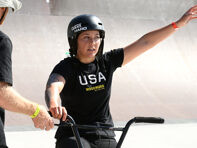At a meeting in Switzerland last month, world sports federations including the Union Cycliste Internationale — the governing body of cyclists — reached a consensus on potentially changing eligibility standards for transgender athletes who compete in elite women’s sports.
The International Association of Athletics Federations first announced the result of their Oct. 19 meeting on its website, on Oct. 31. Transgender and cisgender athletes reportedly were represented at that meeting.
News reports appearing in Bicycling.com and other news sites this week focused on one trans cycling athlete in particular, and they stressed the proposed requirement that trans athletes meet a new, lower level of testosterone than is currently favored by the International Olympic Committee.
While the IOC reportedly is leaving levels as they are now, the reports say the cycling group and other international sports federations have reached a consensus on the proposal. But this is not an automatic change, according to the UCI: “The text concerned will be submitted for approval by the UCI Management Committee with a view to application in 2020.”
The IAAF listed these bullet points to summarize the consensus among the federations:
- They remain committed to fair and equal opportunity for female athletes
- The inclusion of trans women within the female category should be promoted with meaningful eligibility standards, provided it does not create intolerable unfairness
- Rules intended to accommodate trans athletes should be sports-specific and designed by the relevant international federation.
- Testosterone is the primary known driver of the performance gap between males and females and serum Testosterone is regarded as an acceptable proxy to distinguish male from female athletes.
- If a federation decides to use serum Testosterone for this purpose, it should adopt a fixed threshold at or below 5nmol/L for eligibility for the female category.
- More research is needed on this issue and should be encouraged by sports federations.
It’s important to note that this push to change testosterone levels is a favorite talking point for the IAAF, which fought long and hard to establish a lower mandatory testosterone policy in regards to athletes like Caster Semenya, who are born with naturally elevated levels of the hormone. And if Semenya is the unfortunate poster child for athletes with DSD — differences of sexual development — then Dr. Rachel McKinnon is unquestionably the target of anti-trans inclusion forces.
Following those reports in Bicycling and elsewhere, activists have again seized upon McKinnon’s successful defense of her cycling title in Manchester, England last month, and her willingness to stand up for her right to compete, as proof she is “a cheat and a bully.” All that despite the fact McKinnon followed every rule to the letter, and did not win most of the events she competed in.
The bottom line, as McKinnon made crystal clear on Twitter Thursday: a change in the maximum level of testosterone allowable for a trans woman to compete in women’s cycling “will have no effect on my eligibility.”
Hate to break it to y'all, but lowering the testosterone limit to 5nmol/L will have NO EFFECT on my eligibility.https://t.co/JjuY5Ge35u
— Dr. Veronica McKinnon (@rachelvmckinnon) November 7, 2019
Why does media @BicyclingMag keep connecting me to such policies when they'll have no effect on me?
Why is that the case? Suffice to say, it’s her personal business, not anyone else’s. If she wanted to disclose her medical records, we’re sure she would. Draw your own conclusions.
McKinnon made a point to tag Bicycling magazine in her tweet, which she felt had dragged her for clicks, not because this developing story impacted her. And that of course once again put a target on her back, and served only to spread transphobia. She elaborated:
You could lower it to 1.0nmol/L (lower than the women's average) and it STILL wouldn't affect my eligibility.
— Dr. Veronica McKinnon (@rachelvmckinnon) November 7, 2019
Connecting me to these policies is fearmongering.
And McKinnon also took direct aim at the policy the federations are focused on:
This is NOT an evidence-based policy. There is no scientific evidence behind this. None at all.
— Dr. Veronica McKinnon (@rachelvmckinnon) November 7, 2019
It will be immediately challenged in CAS, and it will lose for exactly the same reason the IAAF lost in Chand 2015.
She’s referring to the Court of Arbitration for Sport, and the case of sprinter Dutee Chand of India, another athlete who’s higher than typical testosterone levels sparked controversy and a ban. But after a long court battle, Chand won the right to compete as a woman.
Incidentally, if you’re wondering… who is this Veronica McKinnon… here’s the answer;
I've been toying with going by my middle name for a little while: Veronica.
— Dr. Veronica McKinnon (@rachelvmckinnon) August 20, 2019
It's not that I don't like 'Rachel,' but Veronica is what my parents would have named me if they got it right the first time 😊





































